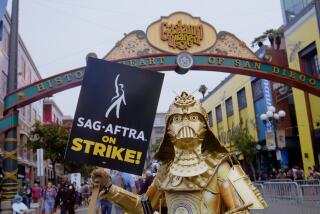Cuba Trade Show Whets Appetites of U.S. Firms
- Share via
WASHINGTON — Forty-three years after they fled the onslaught of revolution, U.S. companies are streaming back to Cuba this week, to the consternation of key people in the State Department.
The occasion is a mammoth food and agricultural trade show, the biggest U.S.-Cuban economic event since the 1950s. It is attracting nearly 300 U.S. firms and tens of thousands of people, as well as two buffalo calves from North Dakota and the Dancing Raisins from California.
To supporters of U.S.-Cuba trade, the five-day gathering that starts Thursday is a symbol of the growing desire for economic connections that have been thwarted by the 4-decade-old trade embargo. More pragmatically, it will decide how Cuba parcels out tens of millions of dollars in contracts--and with whom the Cubans will build long-term trade relationships.
The event comes at a time when Congress, under pressure from a growing bloc of farm state lawmakers, liberals and others, weighs dumping long-standing restrictions on travel to the island country.
Under a 2-year-old liberalization of the trade embargo, Cuba is allowed to buy U.S. food products if it pays cash. But the cash-only restriction sharply limits deal-making. Businesses would like to sell food on credit terms, as they do to most countries, and be free to sell a full range of other products as well.
“We’re going down there to hold an olive branch to the Cuban people, and offer to deal with them just as we do with everybody else,” said Mike Mauricio, owner of Florida Produce of Hillsborough County, a wholesaler and broker.
Yet traditional Cuban American groups and their allies in the Bush administration see the show far differently, and their criticism has complicated the deal-making even before the doors open.
They fear that U.S. trade will give the regime badly needed cash to sustain itself, and they portray the trade show as a plot hatched by Cuban President Fidel Castro and U.S. agribusiness to put more pressure on Congress to abandon the embargo.
“This is a pyramid scheme of monumental proportions,” said Joe Garcia, executive director of the Miami-based Cuban American National Foundation.
The Bush administration has licensed the event, signaling that it meets the requirements of U.S. law for such a gathering of Americans in Cuba.
Yet the top State Department official for Latin American affairs, Assistant Secretary Otto J. Reich, has made clear his disapproval. He set off a small flap by cautioning Minnesota Gov. Jesse Ventura and others who plan to attend the show “not to participate in sexual tourism, which is one of the main industries in Cuba.” He said high-profile visitors are “used as props” by the Castro government.
Florida Gov. Jeb Bush, whose prospects in the November election ride partly on support from the Cuban American community, has urged Ventura to stay home.
Yet such pressures have done little to discourage businesses or the many state officials who want to help build their local export industries.
In all, 285 companies from 33 states are showing products at the huge white Pabexpo convention center in the Havana suburbs. These include such big names as Archer Daniels Midland, which is the chief sponsor of the event, as well as Cargill, ConAgra Foods, Hormel Foods, Perdue Farms and Tyson Foods. Exhibition space in three big halls has been sold out for weeks.
The Americans have shipped in small herds of livestock, and California is sending its Dancing Raisin mascots in hopes of opening deals for the state’s products.
U.S. businesses hope their appearance can revive Cuban demand for long-standing brands that Cubans knew before the revolution, such as Aunt Jemima pancakes, Kellogg’s cereals, Uncle Ben’s rice and even Spam, which is well liked in Cuba, industry officials say.
When Congress passed the 2000 law authorizing cash food sales, Castro at first signaled that he didn’t intend to take advantage of the opportunity. But he changed his mind, and has made purchase after purchase.
In 2000, Cuba ranked last among the 228 countries and territories that import U.S. food and agricultural products. But in 2001, it jumped to 144th, and this year it’s expected $135 million in purchases will make it 52nd, according to the U.S.-Cuba Trade and Economic Council.
U.S. agribusiness has tried to build political support for an end to the embargo by spreading the contracts among as many states as possible--just as defense contractors spread subcontracts around the country to build broad political support for multibillion-dollar procurement projects.
That was the brainchild of Archer Daniels Midland, an agribusiness giant with $20 billion in annual revenue and extensive U.S. political influence.
The top beneficiary of open trade would probably be Florida because of its proximity and historical ties to Cuba, even though the state is home to the staunchly anti-Castro Cuban Americans.
Florida is sending 31 companies to the exhibition, more than any other state.
Mauricio, the Cuban American owner of Florida Produce, says this reflects the fact that there’s more than one point of view in the Cuban American community about the embargo.
“Economic embargoes do no good,” he said. “They hurt the common people.”
Some other businesses worry that the politics surrounding the event could lead to criticism, and won’t even disclose their names. Some advocates of the event have sought to minimize the politics.
“The exhibitors have specifically asked that anyone with a political agenda stay home and stay out,” said John Kavulich of the U.S.-Cuba Trade and Economic Council.
Yet it will be difficult to keep politics out of it, especially because Castro himself promises to tour the exhibitions.
Castro has been trying to build support for an end to the embargo since 2000 by lobbying a succession of U.S. public officials, including Sen. Barbara Boxer (D-Calif.), Sen. Maria Cantwell (D-Wash.) and North Dakota Gov. John Hoeven, a Republican.
Anti-Castro activists contend that the Cuban leader has funneled his scarce cash to U.S. food contracts, with the goal of sharpening the American appetite for a new market of 11 million people. They say this has meant that Castro has been unable to pay debts to countries that have long been food suppliers, such as Canada and European and Latin American nations.
They contend that if U.S. businesses trade on credit, Cuba will default and U.S. taxpayers will have to make good on what is owed to American companies.
And they argue that the Cuban market will never really be an important source of sales for U.S. business--or at least, not until it has a free-market system.
Dennis Hays, a former U.S. diplomat who is executive vice president of the fiercely pro-embargo Cuban American National Foundation, says some U.S. businesses appear to have been dazzled by the “forbidden fruit” of trade with Cuba and the opportunity to get a close look at the Communist government.
“It seems there’s been a frenzy of ‘Let’s all go to Disneyland’
But Brian Alexander, policy director of the pro-trade Cuba Policy Foundation, suggested that the real dinosaur is U.S. policy toward Cuba. He said the unexpectedly strong interest in the show is a demonstration that U.S. businesses have taken the initiative in building ties to Cuba, even as the politicians have continued to squabble.
“Business has moved ahead of policy,” he said. “It’s time for policy to catch up.”
More to Read
Inside the business of entertainment
The Wide Shot brings you news, analysis and insights on everything from streaming wars to production — and what it all means for the future.
You may occasionally receive promotional content from the Los Angeles Times.











